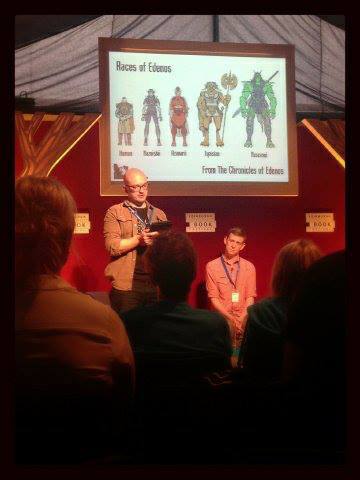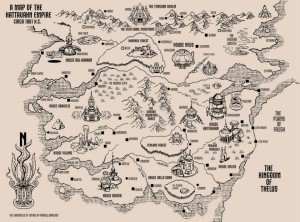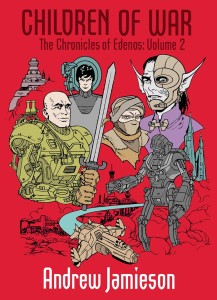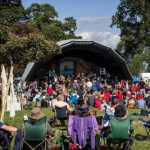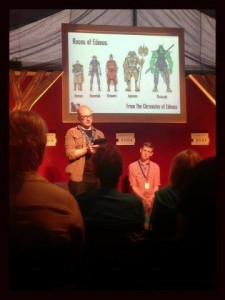 Derby-born Andrew Jamieson is based in Edinburgh, from where he edits the UK Geek Zine website as well as authoring the fantasy ‘Chronicles Of Edenos’ series. The first part of the series ‘The Vengeance Path’ was released two years ago and the follow-up ‘Children Of War’ is out now through Edinburgh publishers Thistle In The Kiss. Our man Nathan O’Hagan caught up with him to discuss his work and his wider thoughts on publishing.
Derby-born Andrew Jamieson is based in Edinburgh, from where he edits the UK Geek Zine website as well as authoring the fantasy ‘Chronicles Of Edenos’ series. The first part of the series ‘The Vengeance Path’ was released two years ago and the follow-up ‘Children Of War’ is out now through Edinburgh publishers Thistle In The Kiss. Our man Nathan O’Hagan caught up with him to discuss his work and his wider thoughts on publishing.
Children of War is the follow up to your debut The Vengeance Path, part of the ongoing Chronicles of Edenos series. Chronologically, does CoW continue immediately on from events in TVP?
The new book picks up straight away from the end of TVP. I was tempted to mess around with chronology but there was no good reason to. I like the fact that it drops you straight back into the action. I’m a big fan of starting with some impact, so the book opens with a brisk action sequence.
Were you tempted to take a break from the series? You’ve said there will be five books in the series, that’s potentially the best part of a decade of your life given over to Edenos.
Yes, I was very tempted to take a break. The amount of time dedicated to writing these beasts is not lost on me! My initial instinct was to write something completely different after the the 1-2-3 of The Vengeance Path, The Lost Brother and The Winter Throne. The latter two were short instalments in the Chronicles that can be read aside from the main volumes. They were good writing exercises and I enjoyed them as short side-episodes of the series. I had a very clear vision of how Children of War should start and felt compelled to get cracking on it. I’m glad I did now. Children of War anchors the series, for me at least, and I feel more confident in taking a step back and trying something different now. A palate cleanser, if you will.
Presumably you’ve got a lot of the story arcs for the five books worked out already. Is it hard to pace yourself when writing, to always be holding something back?
I have a lot of the big story arcs mapped out but a lot of the finer details will develop as I go. Book three in the series will be as different from book two, as it is from book one. It can be tricky to think ahead, in terms of what each book needs to achieve as part of the series, rather than any issue with pace of writing. I am finding that one of the major challenges of writing books in a series is making each instalment valid on its own terms as a self-contained story as well as part of the whole.
TVP managed to gain something of a cult following, particularly amongst fans of steampunk/fantasy. It was also nominated for a debut novel of the year award. Were you surprised how well it was received?
I was a little surprised. I felt I had written something pretty good and it was nice to see some very complimentary reviews. Personally, on reflection, I think it needs another draft. Hindsight, eh? As for Cult status, that works on two levels of definition for me: Cult can mean something that set out aiming for the mainstream but fell short for whatever reason but eventually finds its audience. Cult can also mean something that starts out small with modest ambitions and is well received, gaining favourable word-of-mouth praise. I think The Vengeance Path maybe falls into the latter. I’m still amazed anyone has read it!
The publishing world has changed a lot in recent years, though predictions of the death of print publishing seem to have been premature. How do you see the future of publishing, particularly as someone who works primarily in Epublishing?
The ongoing big issue for me, as a digitally published author, is the fact that the buying public won’t find print copies of my books anywhere. I don’t intend to stay solely an ebook author. I would love to see my books on a shelf in a bookshop (I used to work in a Waterstone’s). One day. As per the future of the industry, digital self-publishing has made the market more competitive and has become a good arena for writers to learn their craft and trade. But I have yet to see any publisher truly get to grips with the potential of the digital format. Downloadable Apps, such as the Vengeance Path App (still available from the online Google Play store for FREE *plug over*) are a hint at what can be done. Interaction and multimedia are aspects that I expect to explored in digital publishing in the years to come.
Do you find there is a real sense of community amongst fantasy writers, more so than there is amongst general fiction writers?
Tricky question. I feel solidarity with fantasy writers (a mixture of empathy/admiration) but personally I only know a handful across Britain. From what I have witnessed, I would say that there is perhaps less snootiness amongst the fantasy crowd. There is certainly more fervour amongst the fandom!
Having achieved a certain level of success, was that a spur to get to work on the follow-up, or did you feel under pressure to deliver?
A mixture of both pressure and desire. As mentioned above, I was tempted to step away from the Chronicles but I felt compelled to maintain my focus and forge ahead with volume two. Writing, in general, is a painful, thankless, emotionally ravaging task. Good job I love it! Children of War was, at times, equal parts exhilarating and excruciating to write.
You were present at many literary events after TVP’s release, did you get a sense of much crossover, ie non-fantasy readers liking your book?
Perhaps. I think fantasy has partially entered the mainstream consciousness through a number of breakout literary successes (the Harry Potter and A Song of Ice and Fire series are two extremely contrasting examples that come to mind, Lord of the Rings too, most obviously) that have been adapted for the screen. The mainstream reading public are getting more accustomed to the possibility that they might actually enjoy a good fantasy epic.
The huge success of Game Of Thrones has blurred the lines between fantasy and the mainstream somewhat. As a fantasy author, have you felt any benefit from this, or do you think the casual readers are just sticking with the big names such as Martin and Tolkien?
Yes and no. I think the fact that I am an ebook author published by the smallest of independent publishers means I am only going to reach a limited amount of people. If you then also factor in that, generally, most readers like to read more of what they like, then there are possibly plenty of other authors who are benefitting from the success of Martin’s books.
Sci-fi and fantasy often have allegories to contemporary political or social events. How much does ‘the real world’ influence your work? Are you interested in making political or social points or are you just interested in telling a good story?
I love history and I’ve poured some of that interest into the Chronicles. Allegorical writing is a tricky business and I can’t think of any fantasy writer, off the top of my head, who has done so successfully. Tolkien had no love of allegory, for example. I think allegory is mostly a critic’s tool. I am interested in politics, religion and sociology (I work part-time as a care worker so it is almost impossible to not have an opinion on such things). Primarily, I’m interested in story first but politics et al can be weaved into fantasy, if the story allows for it. For example, most fantasy stories are set against a feudal, aristocratic backdrop. The Chronicles of Edenos is too. But the Hattavahn Empire, seen in books one and two, is a decaying institution, falling apart through corruption and civil war. I’m interested in exploring that angle over the rest of the series.

